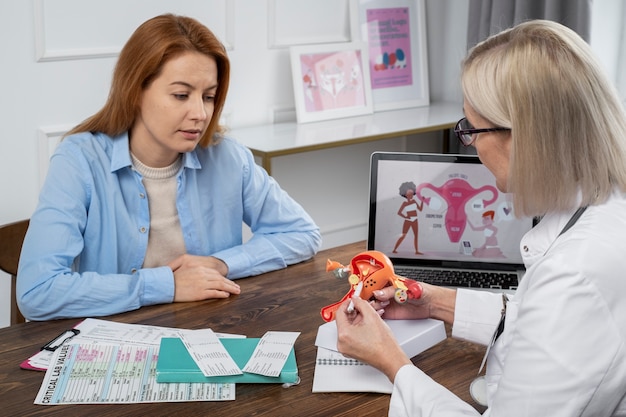
What is Polycystic Ovary Syndrome (PCOS)?
Polycystic ovary syndrome, often called PCOS, happens when a woman’s hormones are out of balance. This can lead to problems with getting pregnant and issues with her period. Sometimes, the hormonal changes can even affect how a woman looks.
It’s important to treat PCOS right away to control symptoms and prevent long-term problems. If untreated, PCOS can lead to serious health issues like heart disease and diabetes. It’s quite common and symptoms can start as early as the teenage years.
What Happens with PCOS?
To understand PCOS, you first need to know what hormones are. Hormones are chemical messengers that play a key role in processes like growth and energy production. Usually, one hormone triggers the release of another. With PCOS, these hormonal signals get mixed up.
For instance, a woman might produce more androgens, which are male-type hormones. This can cause symptoms like acne, extra facial or body hair, and sometimes stop ovulation. The body might also have trouble using insulin, which can raise blood sugar levels and increase the risk of diabetes if not managed properly.
Common Symptoms of PCOS
Symptoms of PCOS can vary but often start off mild. They include:
– Acne
– Trouble with weight gain or loss
– Extra body hair
– Thinning hair
– Irregular periods
– Depression
– Fertility problems
Small cysts may also form on the ovaries. These aren’t harmful but contribute to hormonal imbalances.
Causes of PCOS
Hormonal changes causing PCOS can have many different triggers. Often, PCOS runs in families. You have a higher chance of having PCOS if other women in your family have it.
Diagnosis and Treatment of PCOS
When you see a doctor, they’ll ask about your health history, symptoms, and menstrual cycles. A physical exam might check for signs of PCOS like high blood pressure and extra body hair. Your BMI might also be checked.
Hormone tests help doctors diagnose PCOS and rule out other issues like thyroid problems. An ultrasound might be done to check for ovarian cysts, though it’s not always needed.
Treating PCOS often involves:
– Exercise
– A healthy diet and weight management
– Medication to balance hormones
Treatments aim to reduce symptoms and prevent long-term health problems. Eating heart-healthy foods and regular exercise can help manage PCOS. A balanced diet with fruits, vegetables, nuts, beans, and whole grains supports heart health. Avoiding smoking is also important as it raises androgen levels and heart disease risk.
Medications like birth control pills can regulate periods, while others, like spironolactone, reduce androgen levels. If trying to conceive, certain medications may not be used.
Managing Symptoms
During treatment, consider methods for managing specific symptoms like facial hair and acne. There are acne treatments and hair removal options like waxing or shaving.
Support and Mental Health
Dealing with PCOS can be tough. Seek help from a counselor or support group if you’re feeling down. Talking to others who understand what you’re going through can be very helpful.
Be patient with yourself and your treatment. Adjustments might be needed over time, and symptoms may take a while to improve.